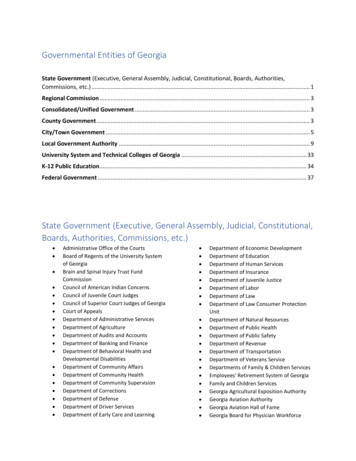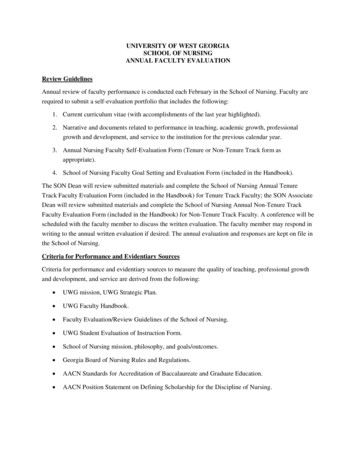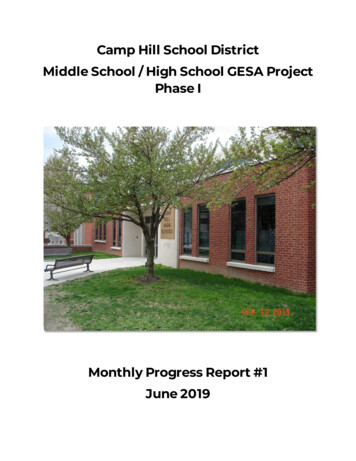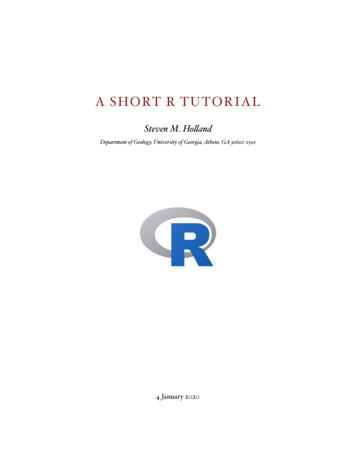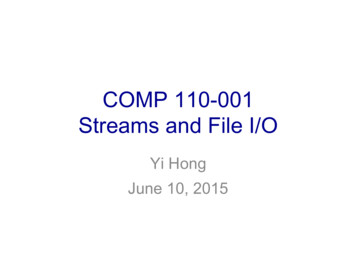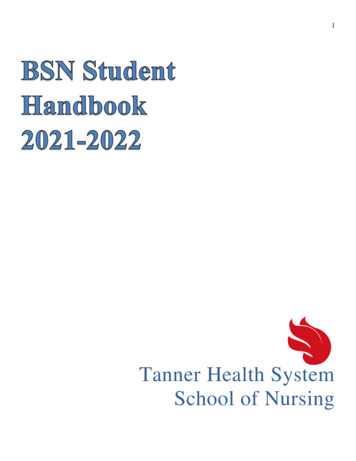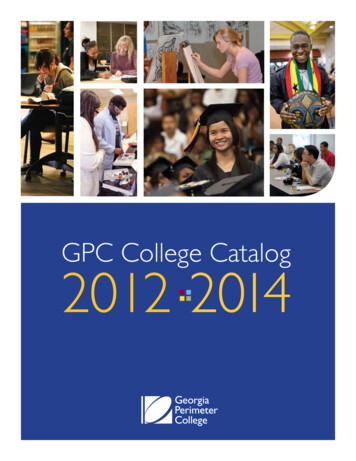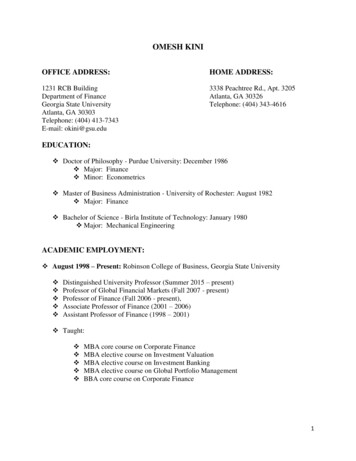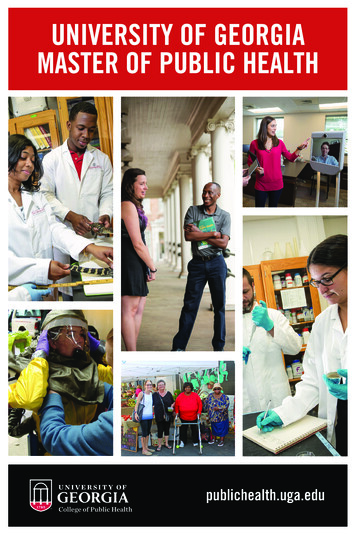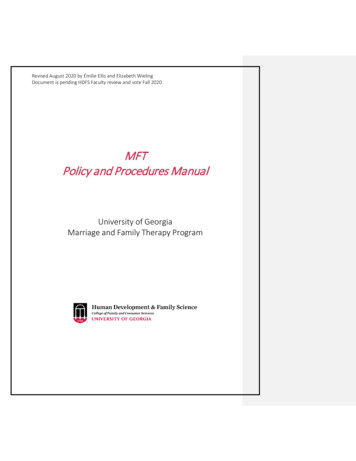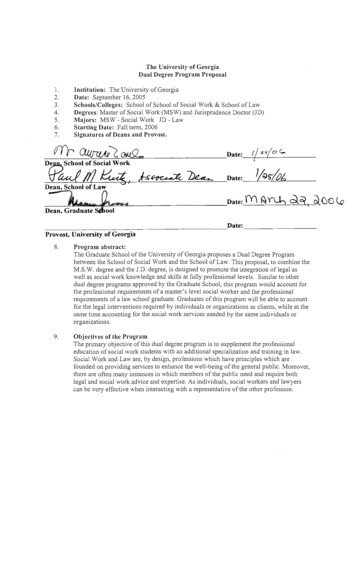
Transcription
The University of GeorgiaDual Degree Program Proposal1.2.3.4.5.6.7.Institution: The University of GeorgiaDate: September 16, 2005Schools/Colleges: School of School of Social Work & School of LawDegrees: Master of Social Work (MSW) and Jurisprudence Doctor (JD)Majors: MSW - Social Work JD - LawStarting Date: Fall term, 2006Signatures of Deans and Provost.Date:D e a School of Social WorkDate:(/1Y/OcrV Ear* (33;300bDean, Graduate S&oolDate:Provost, University of Georgia8.Program abstract:The Graduate School of the University of Georgia proposes a Dual Degree Programbetween the School of Social Work and the School of Law. This proposal, to combine theM.S.W. degree and the J.D. degree, is designed to promote the integration of legal aswell as social work knowledge and skills at h l l y professional levels. Similar to otherdual degree programs approved by the Graduate School, this program would account forthe professional requirements of a master's level social worker and the professionalrequirements of a law school graduate. Graduates of this program will be able to accountfor the legal interventions required by individuals or organizations as clients, while at thesame time accounting for the social work services needed by the same individuals ororganizations.9.Objectives of the ProgramThe primary objective of this dual degree program is to supplement the professionaleducation of social work students with an additional specialization and training in law.Social Work and Law are, by design, professions which have principles which arefounded on providing services to enhance the well-being of the general public. Moreover,there are often many instances in which members of the public need and require bothlegal and social work advice and expertise. As individuals, social workers and lawyerscan be very effective when interacting with a representative of the other profession.
social justice and equality for all. While the academic requirements will be upheld foreach program, students will achieve the M.S.W. and J.D. degrees in 8 semesters.10.Justification and need for the Program:a. Benefits: The profession of social work includes service to a variety of client subjects:individuals, groups, nonprofit organizations, social agencies, businesses, communities,and legislatures. The profession of legal service, working as a lawyer, addresses thesame array of client subjects. For example, they might focus on the legal and social workneeds of an indigent defense client, the needs of a nonprofit working on communityeconomic development, a social agency formulating it’s services under federalregulations and shaping a work force to meet those obligations, addressing issues ofemployee-business management relations, or forging changes in legislation which affectssocial work clients. There are many instances, however, when members of the twoprofessions are not readily available, and there is a great advantage of one person havingthe combined knowledge and practice expertise of both a social worker and a lawyer. Theperspective of both professions in one person makes it feasible to render services moreeffectively and efficiently. Contradictions can be avoided, of course, in this context.b. Student Demand: Although the MSW/JD degree program is not yet established, it isnoteworthy that, upon graduation, a number of social work students from previousclasses have entered the School of Law. Thus, a major advantage of the Dual DegreeProgram is responding to the desires of student applicants. The quality of studentsapplying to the Dual Degree Program will be unique, in expressing the desire to renderboth social work and legal services combined. The advantage to the School of SocialWork is that it appeals to students who have legal interests and can interject legalknowledge and practices into their social work. The advantage to the School of Law isthat it appeals to students who can interject social work knowledge, skills, and valuesinto their legal work. Knowing that this is a personal desire, students will look forinstitutions which have such dual degree programs. As evidenced by the number ofinquires from prospective students, an MSW/JD dual degree program would be uniquelyexceptional, not only in Georgia, but throughout the Southeastern Region.c. Additional justification: The dual MSW/JD degree is not uncommon. A cursoryreview of the academic institutions across the country identified fifteen major universitiesand colleges which currently offer a dual MSW/JD degree from accredited programs.Current MSW/JD Combined Degree ProgramsUniversity of North CarolinaBoston CollegeUniversity of MarylandNew York University, BuffaloWashington UniversityFlorida State UniversityUniversity of MichiganNew York University, AlbanyCalifornia Western UniversitySan Diego State UniversityUniversity of ConnecticutUniversity of ColoradoWalden UniversityWashburn UniversitySpringfield College2
The Program of Study described in the current proposal was developed following areview of a sample of the above listed combined programs (Appendix I). From this, itwas determined that attention should be given to students residing in the southeasternregion who are interested in both social work and law. This conclusion was reached byconsulting with a number of social workers and lawyers in the context of a variety ofissues: corrections, indigent defense, family custody law, community economicdevelopment, health, immigration, domestic violence, and welfare. Two of theparticipants of the committee that was formed to formulate this program proposal wereindividuals with both the Masters of Social Work Degree and the Juris Doctorate Degree.They confirmed these findings.11.Program Development:In 2000, an ad hoc committee was established, including members of both Schools andboth practice professions. Dr. June Hopps, the School of Social Work’s ResearchProfessor, had formulated such a program at Boston University when she was Dean ofthat School of Social Work, also participated on committee. The Dual Degree Committeeincluded the Director of M.S.W. Admissions, as well as the Director of Admissions inthe School of Law. The Director of Externship Programs in the School of Law providedconsiderable consultation and input into the development of the program. A variety ofexisting MSW/JD Dual Degree Programs were studied and it was concluded thatgraduates of such a program would not only be highly marketable, but fulfill a greaterservice to the citizens of Georgia. The purpose, rationale, admission policies, andcurriculum content were drafted. In March, 2001, the School of Social Work faculty waspresented with the proposal and approved it in April. The proposal was presented to theSchool of Law faculty in the fall of 2002, and it was approved.12.Curriculum:The proposed Dual Degree Program will not require a change in the curriculum or credithours currently required for the M.S.W. and J.D. degree.a. Course of study for the dual MSW/JD degree program: See Attachment Ib. Current program of Study for the M.S.W.: See Attachment IIc. Current program of study for the J.D. degree: See Attachment III13.Program Administration:The Dean of the School of Social Work is responsible for all programs. The authoritativedecision maker in the School of Social Work will be the Associate Dean in conjunctionwith the Director of the M.S.W. Program in the School. Admission to the M.S.W.Program will be managed by the M.S.W. Admissions Committee, which is coordinatedby the Director of M.S.W. Admissions. Advisement in the School of Social Work ishandled through the M.S.W. Program office. Practicum arrangements are theresponsibility of the Director of Field Instruction.The Dean of the School of Law is responsible for all programs. The authoritativedecision maker is the Associate Dean. Advisement in the Law School is handled through3
the Director of Externships. The Director of Admissions will coordinate all admissiondecisions with the Admissions Committee in the School of Law.To be eligible for this Dual Degree Program, students must apply separately and beadmitted into the School of Social Work at the Master’s level and by the Law School forthe full Jurisprudence Doctorate. As such, applicants must meet all of the requirementsfor admission to each program. Individually, the M.S.W. is currently awarded aftercompleting a two-year program of study, while the J.D. is earned after three years ofrequired coursework. The proposed dual MSW/JD degree would be awarded followingthe completion of a four year integrated Program of Study.Upon admission, the student must complete the initial requirements, or foundation yearcurriculum, of each of the two programs. In the third year, the student will enroll in an“integrated” curriculum consisting of courses in both social work and law. Thisintegrated program of study in the third year will include a student completing therequirements of the M.S.W. program, in addition to participating in a professionalinternship with both social work and legal field instruction. In the fourth year, the studentwill complete the final year of the J.D. program. After successful completion of theprogram requirements, the student will then be prepared to initiate the licensingprocedures with respect to each of the two professions.Both programs have approved the sharing of credits with the other program. Of the 120credit hours, 30 credit hours are shared between the Law School and the School of SocialWork. The Law School achieves 14 credits in the School of Social Work and the Schoolof Social Work achieves 16 credits in the Law School. Of the remaining 90 hours, 30 areexclusively in the social work curriculum and 60 are in the law program. Thus a total of76 credits are taken exclusively in law and 44 exclusively in social work.For example, during the integrated third year of the program, MSW/JD students will taketheir requirement for Advanced Policy Analysis in Social Work in the Law School.Suggested courses related to Advanced Policy currently offered in the Law Schoolinclude Law and Society, Family Law, Law and Environment, Law and Disability, andEmployment Law.Independently, the School of Social Work and the Law School currently require studentsto complete a practicum internship for the respective degree programs. The proposedDual Degree Program will provide students with a required integrated practicuminternships during the third year. The integrated internships provides the student with theopportunity to practice both social work and law in a practicum setting. The internshipplacements provide a broad range of social work and legal experiences and includelegislation, advocacy, legal and forensic social work settings. As well, field supervisionof the placements will be developed in an integrated fashion between the Law School andthe School of Social Work. For example, the School of Social Work may provide a fieldsupervision if the legal agency does not have an MSW on staff. Students will earn tenhours of course credit for the practicum internship which will be shared and used tosatisfy the dual degree program requirements. Suggested practicum sites include Legal4
Aid and Defender Clinics, Georgia Indigent Defense Council, Georgia Justice Project,Southern Center for Human Rights, and Juvenile Courts in Georgia.All administrative issues, admission, curriculum advisement, and integration ofpracticum, are administered through a partnership arrangement. As previouslymentioned, program admission is handled separately by each school. Advisement onacademic courses is handled separately, focusing on the issues of that portion of thecurriculum for which each school is responsible. The internship/practicum is handledthrough a collaborative discussion and agreement between the Directors of Externshipand Field in the two schools. Field instruction by a lawyer and an approved socialworker will guide the work of the student in the internship.14.Assessment:Members of the MSW/JD advisory committee will formulate goals and establish criteriafor assessing the quality and progress of the program areas. Baseline indices for programgrowth will be the number and quality of student applicants. Suggested criteria todetermine the formative and summative effectiveness of the program as well as thesuccess of students earning the dual degree could include, but are not limited to:a. A longitudinal review of graduates assessing employment status and role in the socialwork and or legal profession conducted annually.b. Program graduates participating in formal exit interviews which include the use ofstandardized measures to assess a student’s perception of the program.c. Assessing the professional licensure pass rate of the program graduates.d. A periodic survey of professionals in the field of social work and law assessing boththe program quality and the competency of program graduates.15.Fiscal and enrollment impact and estimated budgetNo additional fiscal impact as a result of this Dual Degree Program is anticipated.Additional faculty or staff resources will not be necessary for the administration of theProgram. All academic courses identified in the Program of Study for the proposed DualDegree Program are currently being offered. The University of Georgia will need noextra resources to carry out this Dual Degree Program.5
Attachment IIIJD DEGREE PROGRAM OF STUDYFirst Year: Law FoundationFall SemesterCivil Procedure IContracts and Sales ILegal Research IProperty ITorts ICriminal LawCredits23233316Spring SemesterCivil Procedure IIContracts and Sales IILegal Research IIProperty IITorts IICredits3323314Second Year: LawFall SemesterLegal ProfessionConstitutional Law ICorporationsEvidenceTrusts and Estates ITOTALCredits3234315Spring SemesterConstitutional Law IITrusts and Estates IIFederal Income TaxElectivesCredits334616Third Year: LawFall SemesterLawLawLawLawLawTOTALCredits3333315Spring SemesterLawLawLawLawLawCredits33333156
Attachment IIM.S.W. DEGREE PROGRAM OF STUDYFirst Year: Social Work Foundation YearFall SemesterCreditsSpring SemesterSocial Work Policy and the SocialWork ProfessionHuman Behavior in the SocialEnvironment: Theoretical PerspectivesDirect Practice MethodsTheory and Practice withOrganizations and CommunitiesElective333TOTALCredits3333Foundation Practicum andSeminarFoundation ResearchMethodsCultural DiversityTheory and Practice withFamilies and GroupsElective15TOTAL15333Second Year: Concentration YearCommunity Empowerment & Program DevelopmentFall SemesterEvaluation of Community &Institution PracticesCommunity Assessment &Empowerment PracticesElectiveConcentration Practicum24hrs. WeeklyExit ProjectCredits3335115Spring SemesterCreditsAdvanced Policy Analysis 3Program Design ORElectiveElectiveConcentration Practicum24hrs. WeeklyExit Project3351157
Attachment IM.S.W. / JD COMBINED DEGREE PROGRAM OF STUDYFirst Year: Social Work Foundation(first two years could be reversed)Fall SemesterCreditsSocial Work Policy and the SocialWork ProfessionHuman Behavior in the SocialEnvironment: Theoretical PerspectivesDirect Practice MethodsTheory and Practice withOrganizations and CommunitiesElectiveTOTAL3333315Spring SemesterFoundation Practicum andSeminarFoundation ResearchMethodsCultural DiversityTheory and Practice withFamilies and GroupsElectiveTOTALCredits3333315Second Year: Law FoundationFall SemesterCivil Procedure IContracts and Sales ILegal Research IProperty ITorts ICriminal LawCredits23233316Spring SemesterCivil Procedure IIContracts and Sales IILegal Research IIProperty IITorts IICredits3323314Third Year: Social Work and LawFall SemesterCreditsAssessment and Intervention:Concentration Course (Social Work)Evaluation of Intervention:Concentration Course (Social Work)Externship Clinic(Law)Exit Project (Social Work)Family Dynamics/Program Dev.TOTALSpring SemesterExternship, Clinic or Practicum3Exit Project (Social Work)Advanced Social Policy in Law*3Advanced Policy in Law*5Elective in Social Work1315TOTALCredits5133315Fourth Year: LawFall SemesterLegal ProfessionConstitutional Law ICorporationsEvidenceTrusts and Estates ITOTALCredits3234315Spring SemesterConstitutional Law IITrusts and Estates IIFederal Income TaxElectivesCredits3346168
APPENDIX - ICurrent MSW/JD Combined Programs9
10
11
12
13
14
15
16
17
18
19
20
21
22
23
24
25
26
27
28
29
University of Michigan Springfield College New York University, Albany. 3 . existing MSW/JD Dual Degree Programs were studied and it was concluded that graduates of such a program would not only be highly marke
